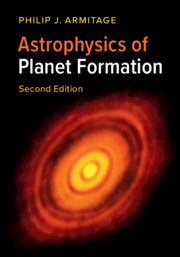Book contents
- Frontmatter
- Contents
- Preface
- 1 Observations of Planetary Systems
- 2 Protoplanetary Disk Structure
- 3 Protoplanetary Disk Evolution
- 4 Planetesimal Formation
- 5 Terrestrial Planet Formation
- 6 Giant Planet Formation
- 7 Early Evolution of Planetary Systems
- Appendix A Physical and Astronomical Constants
- Appendix B The Two-Body Problem
- Appendix C N-Body Methods
- References
- Index
3 - Protoplanetary Disk Evolution
Published online by Cambridge University Press: 27 January 2020
- Frontmatter
- Contents
- Preface
- 1 Observations of Planetary Systems
- 2 Protoplanetary Disk Structure
- 3 Protoplanetary Disk Evolution
- 4 Planetesimal Formation
- 5 Terrestrial Planet Formation
- 6 Giant Planet Formation
- 7 Early Evolution of Planetary Systems
- Appendix A Physical and Astronomical Constants
- Appendix B The Two-Body Problem
- Appendix C N-Body Methods
- References
- Index
Summary
Chapter 3 introduces physical processes that lead to the evolution of gaseous protoplanetary disks. It begins with a derivation of the equation describing the evolution of a thin viscous accretion disk, a discussion of solutions, and introduction of the Shakura-Sunyaev alpha prescription. Hydrodynamic sources of angular momentum transport, including self-gravity, the vertical shear instability, and vortices, are discussed. Magnetohydrodynamic (MHD) sources of angular momentum transport are reviewed, starting with the magnetorotational instability in ideal MHD. The non-ideal induction equation of MHD is derived, and the importance of Ohmic diffusion, ambipolar diffusion, and the Hall effect for protoplanetary disks is reviewed. A simple model for angular momentum loss due to a magnetized disk wind is discussed. The chapter concludes with a description of disk dispersal via photoevaporation, and magnetospheric star-disk interaction.
- Type
- Chapter
- Information
- Astrophysics of Planet Formation , pp. 86 - 140Publisher: Cambridge University PressPrint publication year: 2020

